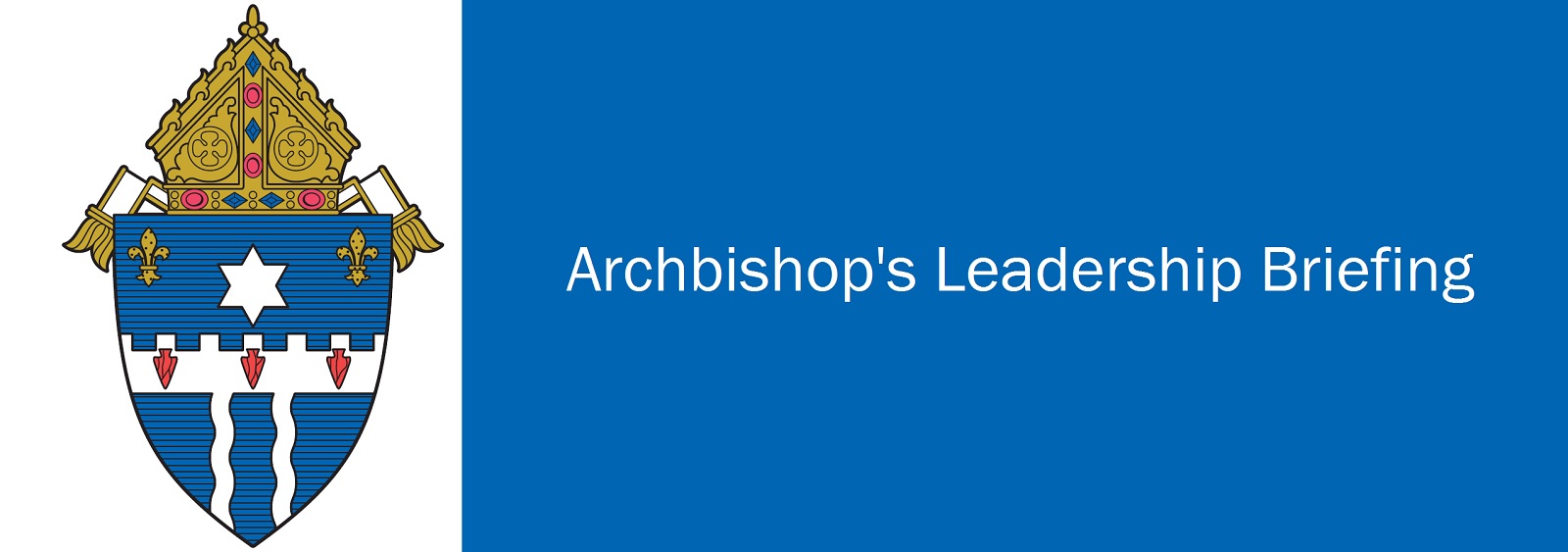 I am writing to you today as archdiocesan leaders to clarify what has become somewhat confusing and distorted by recent public discourse and commentary. Many have written to me in light of the June meeting of the United States Conference of Catholic Bishops and the vote to move forward with the drafting of a formal statement on the meaning of the Eucharist in the life of the Church.
I am writing to you today as archdiocesan leaders to clarify what has become somewhat confusing and distorted by recent public discourse and commentary. Many have written to me in light of the June meeting of the United States Conference of Catholic Bishops and the vote to move forward with the drafting of a formal statement on the meaning of the Eucharist in the life of the Church.
I would like to address both the context and the purpose of this document given the confusion.
The context is a process of Eucharistic revival that will take place from 2022 to 2024. One possible outline for the structure of the statement may reflect on the Eucharist as a mystery to be believed, to be celebrated, and to be lived.
That third part of this mystery – to be lived – will have a section related to Eucharistic consistency, which is the consistency between reception and living a life consistent with church teaching. Since the Eucharist is the source and summit of our faith as Catholics and since there seems to be a lack of understanding about important concepts such as the real presence of Christ in the Eucharist, I believe that such a document is very timely.
A draft will be prepared for our meeting in November, and there will be dialogue among bishops on a regional level between now and then. This document will provide the basis for a multi-year process of formation, celebration, and revival of the Holy Eucharist in the life of the Church.
This document, however, would not provide norms or requirements for a local bishop who may deal with the case of a public figure who takes a public stance contrary to an important church teaching. In these extraordinary cases, canon law urges a bishop to enter into pastoral dialogue with that public figure for the good of his or her salvation. It is also true that, when the dialogue has been exhausted, the bishop has a responsibility to preserve the faithful against scandal, which could include the denial of Holy Communion.
The characterization of this document as an action of the body of bishops involving any particular individual is false.
In the August 12 column in The Record, I will include thoughts about how the Eucharist is to be believed, celebrated, and lived, and I share them here for your reflection:
The Holy Eucharist is a mystery and gift to be believed, to be celebrated and to be lived. These weeks the Sunday Gospel is drawn from the discourse of Jesus in the Gospel according to John, chapter 6. How apt it is to consider the great gift of Jesus when at the Last Supper and at each Holy Eucharist, He says, “Take and eat; this is my body. Take and drink. This is my blood poured out for you.”
Years ago in order to make the reality of the crucifixion come home, a retreat master invited us to imagine removing the corpus of Jesus from the cross and placing a loved one on the cross as a way for us to be moved by another’s willingness to sacrifice and die for us. I placed my mother on that cross symbolically, and I have never again looked at a crucifix in the same way. It is the supreme gift of love for someone to lay down his life for one he loves, and this is precisely what Jesus does in the Eucharist.
We truly believe that the bread and the wine become the body and blood of Christ and make present the one sacrifice of Christ for our salvation. The word of God prepares us for that great sacrificial gift and our reception of communion when we utter “amen” joins us to Christ’s Paschal Mystery.
Recent opinion polls among Catholics show a decrease in the number of people who understand and believe in the true presence of Christ in the Holy Eucharist. In light of this development, a Eucharistic revival is very important because without a strong belief our celebration of the Holy Eucharist will be very shallow and flat.
The Eucharist is a mystery also to be celebrated. We will return the Sunday obligation for all who are physically able in the near future. I picture a grand procession in which not only you and I participate, but we invite another to join and walk with us. That procession leads us to the altar of the Lord where together we once again encounter the one sacrifice of Christ and are drawn to Him and through Him to one another.
Finally, the Holy Eucharist is a mystery to be lived. Sacred scripture is not silent on the importance of seeking to receive our Lord in Holy Communion worthily. Sadly, recent news reports have distorted what the deep tradition of the Church means in the practice of receiving Christ worthily. In truth, the gift of the Eucharist is nothing that we will ever deserve fully, but unfortunately, it is a gift that we can too frequently take for granted and that we can trivialize. The Church as far back as St. Paul (1 Corinthians 11 and 12) calls forth the need to be properly prepared and to live the gift we have received. The dignity of a Christian baptized into Christ Jesus is a gift that we will never lose, but we can live a life that is beneath its great dignity.


